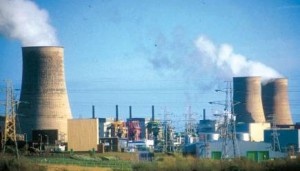
Working to discern patterns of environmental disinformation in an online world
For the past eight years, disinformation has dominated news around elections all over the world. Despite this, it is still a widely misunderstood con...
News

Publish date: May 4, 2011
Written by: Charles Digges
News
Sellafeild, as the site of England’s first nuclear military complex and civilian nuclear power plant Calder Hall, is in the opinion of many environmental groups including Bellona, a continued threat because of its reprocessing activities and is attractive to possible terrorist infiltration.
Bellona physicist Nils Bøhmer said Sellafeild was rich with potential targets for terrorism.
“There is so much radioactive waste and materials concentrated in such a small area – the highest concentration of waste in the world in such a small space – that it cannot help but be a terrorism concern,” said Bøhmer.
Bøhmer said of particular interest to terrorists would be the plutonium bunker and the high-level radioactive waste storage containers.
The arrests of five London men who were reported by local police to be taking photographs of the Sellafield complex was initially worrying because of it timing – quickly on the heels of an announcement by US President Barack Obama late Sunday night that American special forces had killed al-Qaeda chief Osama bin Laden.
Prime Minister David Cameron has said Britain should be extra-vigilant against terrorism in the coming weeks following the death of bin Laden.
The arrested men, who are all their 20s, were detained on Monday shortly after 4:30 pm British time, said a statement from the Cumbria Police. The general announcement to the media of the arrests was not made until early evening Tuesday.
The arrests were made after Civil Nuclear Constabulary officers conducted a stop check on a vehicle close to the Sellafield site, in Cumbria. The Cumbria Police said in a statement that they are all believed to be Bangladeshi.
The arrests are not thought to have been intelligence-led.
The men were held in Carlisle overnight and then moved to Manchester.
Bøhmer, who has visited Sellafield numerous times over the past decade, said security there is tight, and that the Civil Nuclear Constabulary had reacted appropriately.
“Photographs are typically allowed while accompanied on prearranged visits with Sellafield staff, but it is appropriate that unauthorized photography be prohibited against possible terrorist plots,” he said. “It’s common practice.”
Indeed, Bellona has photographed much of the site in reporting trips, and though the photos had to be vetted by staff, they have never been outright censored.
Four houses in east London were raided by counter-terror detectives as part of the investigation.
Scotland Yard told the BBC that a small container was removed at one of the addresses.
Explosives officers were on hand as a precaution during the examination of the container, although the container is now not thought to have had explosives or hazardous material in it, said Scotland Yard.
The North West Counter Terrorism Unit is leading the investigation.
The arrests were made within hours of the news breaking that bin Laden had been killed in Pakistan, and members of the public have been warned to remain vigilant amid fears of reprisals from groups sympathetic to al-Qaeda.
In a statement, Greater Manchester Police (GMP) said: “At this stage we are not aware of any connection to recent events in Pakistan.”
A GMP spokesman told reporters that the investigation is in its early stages and no further information will be released yet.
A police officer can arrest anyone they “reasonably suspect” of being a terrorist under Section 41 of Great Britain’s Terrorism Act of 2000, the British media reported.
The Sellafield site is responsible for decommissioning and reprocessing nuclear waste and fuel manufacturing on behalf of England’s Nuclear Decommissioning Authority.
The site, which has operated since the 1940s, is heavily protected by both private security and officers from the Civil Nuclear Constabulary.
Sellafield was most recently the centre of a controversy over the amount of liquid radioactive waste it is storing on site. The low level liquid waste is a result of Sellafield’s increased reprocessing activities, and the new storage figures for the waste are some two to three times higher than Sellafield initially projected.
Norway is concerned that the amount of liquid radioactive waste, which is stored in 21 containers, could be released into the sea in an accident and foul Norway’s coastline – that the inconceivable actually occurs from time to time,” said .
“We must never forget one of the most important lessons of Fukushima (in Japan): It seems the almost inconceivable actually occurs from time to time,” said Bøhmer at a conference last month regard the waste situation at Sellafield.

For the past eight years, disinformation has dominated news around elections all over the world. Despite this, it is still a widely misunderstood con...

A ruling by the European Free Trade Association Court that Norway’s continental shelf falls under the European Economic Area Agreement could dramatic...

Bellona held a seminar on countering Russian disinformation in the Arctic at the Arctic Frontiers international conference in Norway

Our December Nuclear Digest, reported by Bellona’s Environmental Transparency Center, is out now. Here’s a quick taste of three nuclear issues arisin...